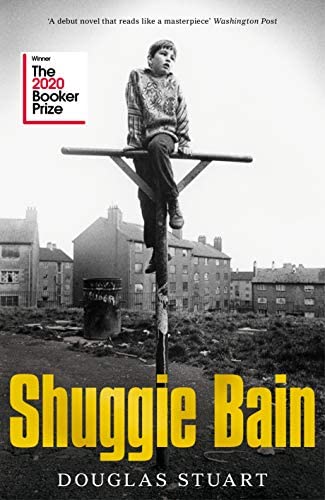WINNER OF THE BOOKER PRIZE
NATIONAL BESTSELLER
FINALIST FOR THE NATIONAL BOOK AWARD
Shuggie Bain is the unforgettable story of young Hugh “Shuggie” Bain, a sweet and lonely boy who spends his 1980s childhood in run-down public housing in Glasgow, Scotland. Thatcher’s policies have put husbands and sons out of work, and the city’s notorious drugs epidemic is waiting in the wings.
Shuggie’s mother Agnes walks a wayward path: she is Shuggie’s guiding light but a burden for him and his siblings. She dreams of a house with its own front door while she flicks through the pages of the Freemans catalogue, ordering a little happiness on credit, anything to brighten up her grey life. Married to a philandering taxi-driver husband, Agnes keeps her pride by looking good—her beehive, make-up, and pearly-white false teeth offer a glamorous image of a Glaswegian Elizabeth Taylor. But under the surface, Agnes finds increasing solace in drink, and she drains away the lion’s share of each week’s benefits—all the family has to live on—on cans of extra-strong lager hidden in handbags and poured into tea mugs. Agnes’s older children find their own ways to get a safe distance from their mother, abandoning Shuggie to care for her as she swings between alcoholic binges and sobriety. Shuggie is meanwhile struggling to somehow become the normal boy he desperately longs to be, but everyone has realized that he is “no right,” a boy with a secret that all but him can see. Agnes is supportive of her son, but her addiction has the power to eclipse everyone close to her—even her beloved Shuggie.
A heartbreaking story of addiction, sexuality, and love, Shuggie Bain is an epic portrayal of a working-class family that is rarely seen in fiction. Recalling the work of Édouard Louis, Alan Hollinghurst, Frank McCourt, and Hanya Yanagihara, it is a blistering debut by a brilliant novelist who has a powerful and important story to tell.
“We were bowled over by this first novel, which creates an amazingly intimate, compassionate, gripping portrait of addiction, courage and love. The book gives a vivid glimpse of a marginalized, impoverished community in a bygone era of British history. It’s a desperately sad, almost-hopeful examination of family and the destructive powers of desire.”—Booker Prize Judges
“The domestic spaces, the blighted landscape, the meanness of people, the bullying at school, the constant threat of violence, all add up to a picture of misery. Against this, however, there is an undercurrent that becomes more and more powerful, as Stuart, with great subtlety, builds up an aura of tenderness in the relationship between helpless Shuggie and his even more helpless mother . . . By drawing Agnes and Shuggie with so much texture, he makes clear that neither mother nor son can be easily seen as a victim. Instead, they emerge forcefully; they are fully, palpably present.”—Colm Tóibín, Bookforum
“Rarely does a debut novel establish its world with such sure-footedness, and Stuart’s prose is lithe, lyrical, and full of revelatory descriptive insights . . . Reading Shuggie Bain entails a kind of archaeology, sifting through the rubble of the lives presented to find gems of consolation, brief sublime moments when the characters slip the bonds of their hardscrabble existence. That the book is never dismal or maudlin, notwithstanding its subject matter, is down to the buoyant life of its two principal characters, the heart and humanity with which they are described. Douglas Stuart has written a first novel of rare and lasting beauty.”—Alex Preston, Guardian


